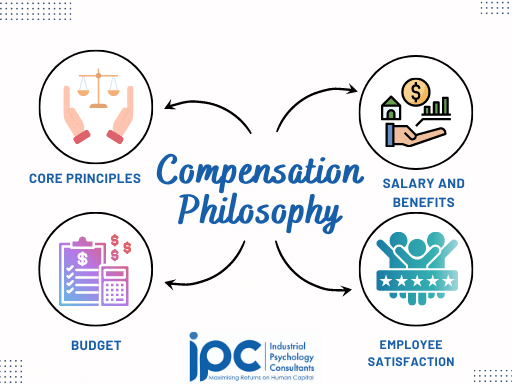A compensation philosophy is a foundation for designing and implementing pay programs. It reflects the organisations values on matters of pay. It provides the overall direction and strategy for how you design and deliver fair pay programs and provide an opportunity for everyone to succeed.
Your compensation philosophy is communicated through the compensation philosophy statement, which provides an overview of your philosophy and describes your overarching pay philosophy and strategies for creating pay programs. Your compensation philosophy is a living document that is always evolving as you learn and adapt to the changing needs of your business and employees.
Written or unwritten, all organisations have a compensation philosophy. Some are focused on pay for performance. Others focus more on ensuring that everyone on the team is fairly compensated. Still, others focus on a combination of the two.
When developing your pay philosophy, its important to define your values, which will help guide you when making pay decisions. Your values will help you determine what youre willing to pay for certain roles, how you set pay ranges, and how you make pay decisions. Your values should reflect your companys culture and help you build a better company. For example, you might say that you value fairness and want to pay employees fairly.
A pay philosophy helps employees understand how youre paying them and sets the foundation for a healthy pay environment. When employees know what youre paying them, it helps them feel valued and motivates them to work hard.
What Is a Compensation Philosophy?
A compensation philosophy is a set of guiding principles that reflects your organisations overarching attitudes toward pay and how it is used in the design and delivery of pay programs. Simply put, your compensation philosophy is the lens through which you view and make decisions about pay.

Core Principles you can use in your compensation philosophy
The following tenets can be used when designing a pay philosophy. These are guidelines; choose what will work in your situation.
- Competitive within our chosen market comparators
- Fair across jobs and locations
- Equitable among employees
- Consistent with the organisations principles and beliefs
- Explainable to our employees.
- The company does not accept discrimination based on race, nationality, gender, sexual orientation, gender identity, religion, age, marriage or family status, pregnancy, handicap, or legally protected status.
- This policy is gender-neutral, compensating men and women equally for equal work.
- All compensation decisions are based on an individuals qualifications, performance and behaviour, or other legitimate business considerations, such as (though not restricted to) the company's profitability and strategic needs.
- We firmly believe that compensation/remuneration dollars should be treated as an investment rather than a cost, and we treat it as such.
- Compensation instruments are designed to align long-term shareholder and employee interests and deliver compensation that promotes sustainable value for the company.
- The company takes a total compensation approach based on two principal components: fixed compensation and variable compensation, including the portion of variable remuneration. The objective is to have an appropriate balance between these elements.
- We will comply with all regulatory requirements.
- Remuneration will be paid based on merit
- We believe that jobs have inherently different value to the organisation. We believe in assigning relative value to each job through a job evaluation process. Remuneration will largely vary by grade and individual performance.
- Job evaluation ensures internal equity and that individuals are compensated consistently relative to their peers, supervisors, and reports.
- External equity matters in our organisation as it ensures that employees are rewarded fairly compared to those who perform similar jobs in other organisations. We will conduct regular market surveys to gauge the competitiveness of our remuneration practices. Such surveys may inform changes to remuneration with a special focus on affordability and sustainability. Overall we will strive to ensure our remuneration components are competitive with our target markets at the 75th This market premium will only be paid to those who have shown consistent performance validated through objective performance assessment tools.
- We place equal importance on both internal(established through job evaluation) and external equity (established through salary surveys), and both will be used to support the company's remuneration strategy.
- No employee will be paid outside their grade salary range for whatever reason.
- We will communicate regularly and honestly with employees about total rewards. We will issue an annual earning statement to each employee at the end of each year. This will enable employees to know how much they will have earned for that year. This will allow them to reflect on the balance between the value they will have created and their earnings.
The Basics of Compensation Philosophy
There are two basic compensation philosophies: pay for performance and pay equity. Pay for performance is a philosophy that focuses on rewarding employees based on their performance and contribution to the organisation. The goal is to incentivise employees to work hard, achieve results, and help the organisation succeed. Pay equity, sometimes called pay for fairness, is a philosophy that focuses on ensuring that employees are fairly compensated regardless of their job title, position, or background.
Human resources professionals have a unique opportunity to help organisations develop a competitive advantage through their pay programs. A competitive pay program provides an opportunity for everyone to succeed. It also supports your business goals, addresses the needs of your employees, and reflects your organisations values. A competitive pay program is built on a strong compensation philosophy.
Compensation philosophy types
A variety of philosophies can guide the design and delivery of pay programs. Some philosophies are designed to provide an opportunity for employees to succeed regardless of background and provide an incentive for employees to work hard and help the organisation succeed. Other philosophies are designed to provide a competitive pay program that supports business goals and provides an opportunity for everyone to succeed.
Some organisations have a single philosophy, which provides the overall direction and strategy for how they create pay programs. Other organisations have multiple philosophies, which provide the overall direction and strategy for creating pay programs and provide additional guidance for how pay programs are designed and delivered. Sometimes, a single philosophy is most effective for an organisation, while multiple philosophies are most effective in other cases.
How to create a compensation philosophy
The first step in developing a pay philosophy is to think about the current state of your pay philosophy. Do you have a pay philosophy at all? If so, is it clear and well-defined? A poorly communicated pay philosophy can do more harm than good.
Define the purpose of the compensation philosophy. The theme or purpose of a compensation philosophy should be clear and concise, and it should be stated in the first paragraph of the compensation philosophy. The theme or purpose of a compensation philosophy provides the direction and strategy for creating fair, effective, and compelling pay programs designed to support the business goals and culture.
Once you have a clear understanding of the goals and expectations, you can start the process of developing a compensation philosophy. The next step is to define the types of compensation programs that will best support your goals and expectations. This will help you determine which kind of compensation philosophy is right for you.
The two most common types of compensation philosophies are outcome-based pay philosophies and performance-based pay philosophies. An outcome-based pay philosophy is designed to provide a competitive pay program that supports the business goals, provides an opportunity for everyone to succeed, and reflects our values.
Salary, benefits, and perks are the three major ways your company communicates its compensation philosophy to employees and managers. Benefits are the non-monetary ways you communicate to employees that you value their contributions.
When we talk about compensation, most people think about salaries and bonuses. But compensation also includes other perks, like health insurance and retirement benefits. Your compensation philosophy also affects how you communicate pay to your employees and the world. The way you communicate pay to employees can play a huge role in determining how well they understand how they're being paid.
Advertisment
Lets look at some statistics. According to a survey by the Institute of Management Accountants, just 18% of companies have a clear, documented compensation philosophy. That means the other 82% of companies are making pay decisions without a clear framework for how to make those decisions. Another survey by the Society for Human Resource Management found that only 28% of companies communicate their compensation philosophy to employees.
The way you communicate your compensation philosophy to employees is just as important as the philosophy itself. Employees deserve to understand why they're being paid the way they are. Sharing your compensation philosophy with employees can help them know how they're being paid and why they're being paid that way. A well-communicated compensation philosophy can help you retain employees and build a better culture.
A pay philosophy is a document that lays out your compensation philosophy, usually in the form of an employee handbook, a document employees can refer to for information about their pay and benefits. The pay philosophy should be employees first turn for information about their pay and benefits. A well-communicated pay philosophy can help you attract and retain the best employees, build a strong culture, and improve employee satisfaction.
The way you communicate your compensation philosophy to employees is important. It sets the foundation for a healthy pay environment. When employees understand how you're paying them, it helps them feel valued and motivates them to work hard. It also helps them understand where they stand in relation to their peers, which helps with retention and increases employee satisfaction.
Developing a pay philosophy is an ongoing process. As you run your business, you'll continue to think about how to pay your employees and make pay decisions. You'll also learn more about your employees, which can help you refine your pay philosophy.
Once you have a well-communicated pay philosophy in place, you can use it to guide your pay decisions, which will help you make more informed decisions and build a better culture.
The truth is that compensation philosophies are incredibly important—they are the backbone of your pay philosophy, which can significantly impact your culture, employees, and business. Developing a well-thought-out compensation philosophy and communicating it to your employees can help you attract and retain the best, build a strong culture, and increase employee satisfaction.
Memory Nguwi is an Occupational Psychologist, Data Scientist, Speaker, & Managing Consultant- Industrial Psychology Consultants (Pvt) Ltd, a management and human resources consulting firm.
Phone: +263 242 481946-48/481950
Email: mnguwi@ipcconsultants.com
Website: www.ipcconsultants.com
